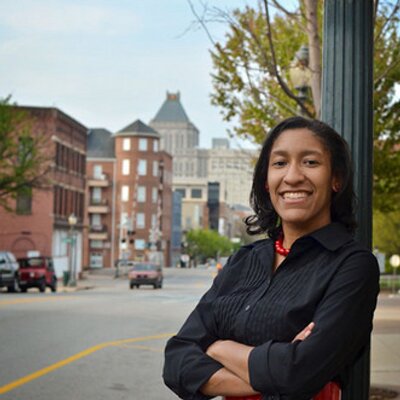 Kristen Jeffers has been a storyteller since her earliest years, writing her first book in grade school and winning an award for her narrative talent. More than a decade later, the Greensboro, NC, native wrote a post on Grist that helped launch her blog status as The Black Urbanist.
Kristen Jeffers has been a storyteller since her earliest years, writing her first book in grade school and winning an award for her narrative talent. More than a decade later, the Greensboro, NC, native wrote a post on Grist that helped launch her blog status as The Black Urbanist.
And now she’s bringing her powerful perspective as a planner and advocate to the people powered movement, taking a post at BikeWalkKC as its communications and membership manger.
In 2010, Jeffers’ question on Grist — “Does Urbanism Have to Be Black and White?” — struck a chord. She posed pointedly relevant questions about the trajectory of the movement to make cities more livable. She tacitly chided the notion that building bike lanes to lure a narrowly construed creative class was a prescription to urban health and vitality (a narrative supported by cycling advocates, too).
Problem is, when I look around, I mostly see only one type of person associated with the urbanist label: young, white, and male. Not many young, black, and female, like me. The word “urban,” when it’s associated with African-Americans, is often synonymous with housing projects, poverty, and the poisoned legacy of urban renewal…
It shouldn’t be that way. To me, urbanism doesn’t mean just bike lanes and transit-oriented development. It also means people willingly walking to others’ homes to share food and wisdom. It means corner stores and barbershops owned and operated by black community members. Things that were commonplace in the neighborhoods my parents and grandparents speak about.
That post elicited dozens of comments — and a call from the Congress for New Urbanism. “At the time, some of the younger, newer voices weren’t being heard within CNU,” Jeffers says, “and it grew from there.”
What grew from there? Jeffers stepping into the role of asking questions, even if she didn’t always have the answers, about the intersections of equity and placemaking. Her blog, The Black Urbanist, is rooted in her own experiences and filled what, especially five years ago, was a particularly large gap in the public conversation.
“At the time, I was reading Streetsblog and Greater Greater Washington and there were certain things being proposed that didn’t have any sensitivity to anybody but white males,” she says. “They weren’t thinking about women or single moms or professional African-American people, like my family and friends. So the blog was about constantly asking those questions and saying, ‘Hey I’m here, I don’t bite and my concerns are valid.’”
Her concerns have addressed an array of complex issues, from gentrification to the intersection of education reform and new urbanism. She’s published a book, been featured as a keynote speaker, and her greatest hits list includes:
- Whose Suburbs are We Talking About Again?
- Can We Let the People Gentrify Themselves?
- The Privilege of Urbanism, The Democracy of Placemaking
- Coming Back to the Streets, Coming Back to Action
- Does it Matter Who Owns the Corner Store?
- The Creative Class: Off the Record and On The Money
- And Reconciling Design and Social Justice in Place
(OK, that last one is my pick, not Kristen’s, but this is enduringly great: “Place is more than the apartment block, the two-story house, the town center, the farm. If we don’t have people who can use the objects of Place, then we are useless. Even worse are people who can build Place but only for profit. Place should be where social justice and design meet.”)
But for Jeffers, it’s not enough to just tell stories. She wants to be an architect of the dialogue in a way that creates change on the ground. That’s why she went to planning school after getting a degree in communications and working in the wordsmithing realm.
“I was drawn toward public service because it was the more adult version of those questions I asked as a kid, like ‘Why is there no rail in Greensboro,’ and ‘Why can’t I safely ride my bike,’” she says. “So I went back and did an MPA in Greensboro and started writing papers on transportation advocacy and urban development. It felt like I was doing things that you can quantify as moving the agenda forward, like design charettes where people can visualize what’s next for them. I really enjoyed that. Doing communications sometimes you put out the information and it just stays there. Not that informing people isn’t important, but I get a thrill from informing and helping.”
And that’s exactly what she’ll be doing at BikeWalkKC, not only leading the charge on communications but increasing the organization’s outreach. One thing she’s particularly excited about: shifting perceptions about the Cowtown’s bike sharing system, Kansas City B-cycle (which is managed by BikeWalkKC), especially in communities of color.
“I’m looking forward to seeing bike share expand to traditionally underserved communities,” she says. “We’re putting our first station in the Jazz District within the month and that will be big.“
But it’s not enough to just plop down a station in the black part of town and declare success. As she’s written about so many times on her blog, Jeffers emphasizes that the legacy of disinvestment and discriminatory practices in those communities has an impact on residents’ perceptions of bicycling and bike share. She’s eagerly watching the equity efforts underway in Philadelphia and is already thinking about translating outreach materials into Spanish, as well. The ultimate goal in her mind: Convince folks that bike share isn’t a toy, but a transportation option.
If you’re a Black Urbanist fan, don’t worry. Jeffers doesn’t plan on abandoning her blog, though she does foresee scaling back a bit. Keep track of her work on the BikeWalkKC blog.

